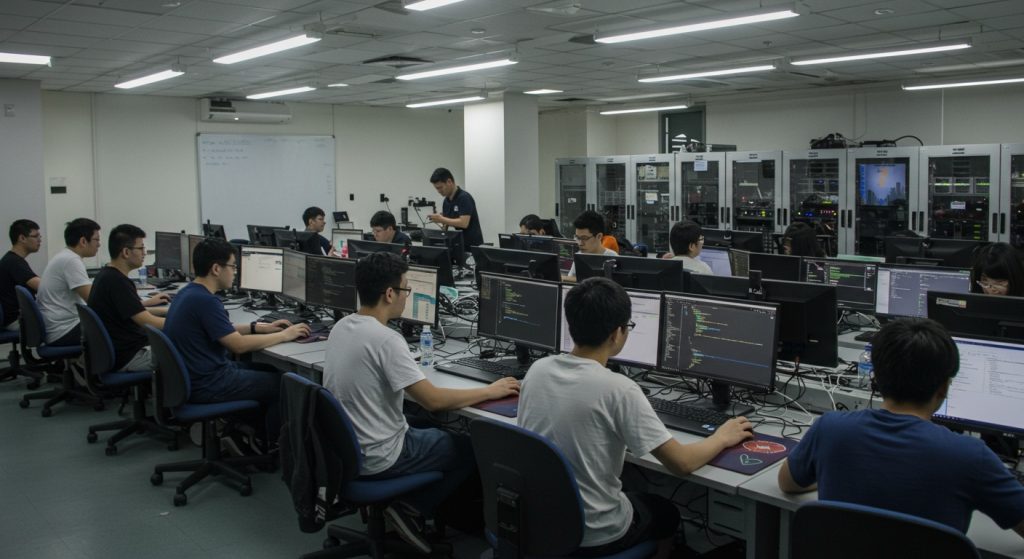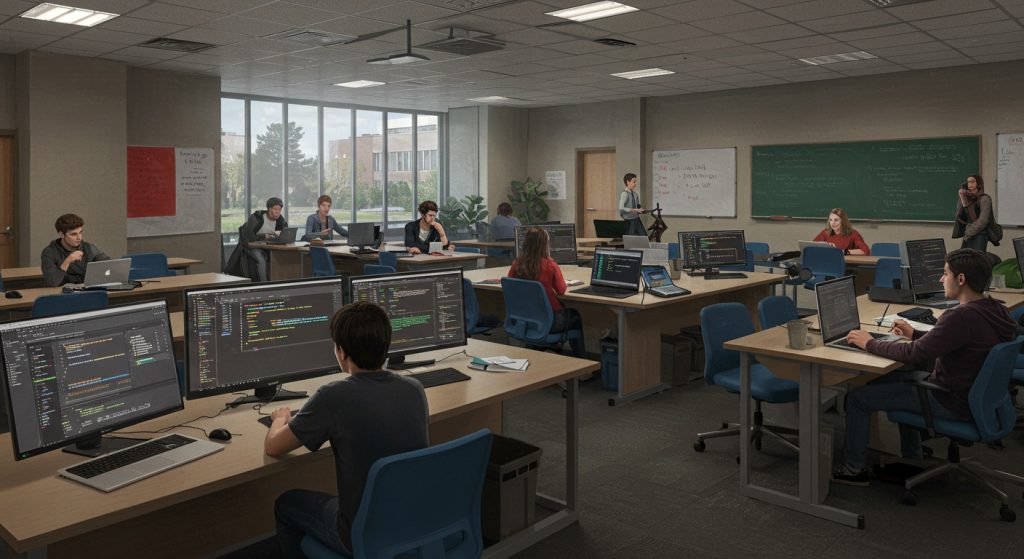Singapore is rapidly cementing its position as a global technology hub, driving immense demand for skilled computer scientists. This surge fuels intense competition amongst universities to deliver premier programs that equip graduates for the future. We explore Singapore’s top Computer Science programs, focusing on those adapting to the AI-driven revolution with specialized tracks in areas like Deep Learning and Cybersecurity – areas where Singapore is actively investing. Expect a rigorous curriculum emphasizing not just theoretical foundations. Also practical application through industry collaborations and real-world projects. We’ll examine program strengths, faculty expertise. Placement records, offering a detailed perspective on which programs best align with individual career aspirations and the dynamic needs of the tech landscape.

Understanding Computer Science: A Foundation for Innovation
Computer Science is more than just coding; it’s a field encompassing the theoretical foundations of data and computation. Their implementation and application in computer systems. It’s about problem-solving using computational thinking, designing algorithms. Building software and hardware systems that power our modern world. Key concepts include:
- Algorithms: Step-by-step procedures for solving problems.
- Data Structures: Ways of organizing and storing data for efficient access and modification.
- Programming Languages: Tools for instructing computers to perform tasks. Examples include Python, Java. C++.
- Operating Systems: Software that manages computer hardware and provides services for applications.
- Databases: Organized collections of data that can be efficiently accessed, managed. Updated.
A strong foundation in these areas is crucial for a successful career in Computer Science.
Navigating the Landscape of Computer Science Programs in Singapore
Singapore is rapidly becoming a global hub for technology and innovation. This has fueled significant investment in Computer Science education, resulting in several world-class programs. When evaluating these programs, consider factors such as:
- Curriculum: Does it cover fundamental concepts and offer specializations in areas of interest?
- Faculty: Are the professors experts in their fields with strong research credentials?
- Industry Connections: Does the program offer internships, projects, or collaborations with industry partners?
- Research Opportunities: Are there opportunities to participate in cutting-edge research projects?
- Career Support: Does the university provide career counseling, job placement assistance. Networking events?
Carefully evaluating these factors will help you choose the program that best aligns with your goals.
National University of Singapore (NUS): A Global Leader in Computer Science
The National University of Singapore (NUS) School of Computing is consistently ranked among the top Computer Science departments globally. Its programs are known for their rigorous curriculum, world-class faculty. Strong research focus. Key features include:
- Breadth and Depth: NUS offers a wide range of specializations, including Artificial Intelligence, Cybersecurity, Data Science. Software Engineering.
- Research Excellence: NUS is a leading research institution, with faculty members conducting groundbreaking research in various areas of Computer Science.
- Industry Collaboration: NUS has strong partnerships with industry, providing students with opportunities for internships and projects with leading companies.
- Global Exposure: NUS offers exchange programs with top universities around the world, allowing students to gain international experience.
NUS also emphasizes interdisciplinary learning, allowing students to combine Computer Science with other fields such as business, engineering. Medicine. For example, students can pursue a double degree in Computer Science and Business Administration, equipping them with the skills to lead technology-driven businesses.
Nanyang Technological University (NTU): Innovation and Application
Nanyang Technological University (NTU) School of Computer Science and Engineering (SCSE) is another top-ranked institution in Singapore. NTU’s programs are characterized by their focus on innovation and application, preparing students to solve real-world problems using technology. Notable aspects include:
- Hands-on Learning: NTU emphasizes hands-on learning through projects, labs. Internships.
- Industry-Relevant Curriculum: NTU’s curriculum is designed to meet the needs of industry, with a focus on emerging technologies such as AI, blockchain. Cloud computing.
- Entrepreneurship Focus: NTU encourages students to develop entrepreneurial skills and launch their own startups.
- Sustainability Emphasis: NTU integrates sustainability principles into its Computer Science programs, preparing students to develop environmentally responsible solutions.
NTU also has a strong focus on research, with faculty members working on cutting-edge projects in areas such as robotics, computer vision. Natural language processing. They have research collaborations with industry and government agencies, ensuring that their research has real-world impact.
Singapore University of Technology and Design (SUTD): Design-Centric Computing
The Singapore University of Technology and Design (SUTD) offers a unique approach to Computer Science education, focusing on design thinking and innovation. SUTD’s Computer Science programs are designed to equip students with the skills to create innovative solutions to complex problems. Key characteristics include:
- Design Thinking: SUTD emphasizes design thinking, a human-centered approach to problem-solving.
- Interdisciplinary Collaboration: SUTD encourages students to collaborate across disciplines, such as engineering, architecture. Business.
- Project-Based Learning: SUTD’s curriculum is heavily project-based, allowing students to apply their knowledge to real-world problems.
- Global Citizenship: SUTD aims to develop global citizens who are equipped to address the challenges facing the world.
SUTD’s curriculum is structured around “pillars,” interdisciplinary areas of study that combine Computer Science with other fields. For example, the data Systems Technology and Design (ISTD) pillar focuses on the design and development of data systems, while the Engineering Systems and Design (ESD) pillar focuses on the application of Computer Science to engineering problems.
Singapore Institute of Technology (SIT): Applied Learning and Industry Integration
The Singapore Institute of Technology (SIT) focuses on applied learning and industry integration, providing students with practical skills and knowledge that are directly relevant to the workforce. SIT’s Computer Science programs are designed to prepare students for careers in specific industries. Noteworthy aspects include:
- Industry-Focused Curriculum: SIT’s curriculum is developed in close collaboration with industry partners, ensuring that it meets the needs of employers.
- Integrated Work Study Programme (IWSP): SIT’s IWSP allows students to gain significant work experience through extended internships with industry partners.
- Specialized Programs: SIT offers specialized Computer Science programs in areas such as cybersecurity, software engineering. Data analytics.
- Skills-Based Assessment: SIT’s assessment methods focus on skills-based assessment, evaluating students’ ability to apply their knowledge to real-world problems.
SIT’s strong industry connections provide students with access to internships, projects. Job opportunities with leading companies in Singapore and beyond. They aim to develop graduates who are ready to contribute to the workforce from day one.
Comparing Key Features: A Quick Reference
| University | Focus | Strengths | Notable Programs |
|---|---|---|---|
| NUS | Research and Breadth | Global ranking, diverse specializations, strong industry links | Computer Science, details Systems, Data Science and Analytics |
| NTU | Innovation and Application | Hands-on learning, industry-relevant curriculum, entrepreneurship focus | Computer Science, Data Science and Artificial Intelligence |
| SUTD | Design-Centric Computing | Design thinking, interdisciplinary collaboration, project-based learning | data Systems Technology and Design (ISTD), Engineering Systems and Design (ESD) |
| SIT | Applied Learning and Industry Integration | Industry-focused curriculum, integrated work study programme, specialized programs | Computer Science in Interactive Media and Game Development, Computer Science (Cybersecurity) |
Beyond the Classroom: Opportunities for Growth
A Computer Science education extends beyond the classroom. Participating in extracurricular activities, hackathons. Industry events can significantly enhance your learning and career prospects. Consider:
- Joining Student Clubs: Participate in coding clubs, robotics clubs, or AI clubs to learn from peers and work on collaborative projects.
- Attending Hackathons: Compete in hackathons to develop your coding skills, network with industry professionals. Build your portfolio.
- Completing Internships: Gain real-world experience through internships with leading technology companies.
- Networking at Industry Events: Attend industry conferences, workshops. Seminars to learn about the latest trends and connect with potential employers.
These opportunities can help you develop valuable skills, build your network. Gain a competitive edge in the job market. Many companies also sponsor or participate in these events, providing further opportunity to build connections.
Career Paths for Computer Science Graduates
A Computer Science degree opens doors to a wide range of career paths. Some popular options include:
- Software Engineer: Develops and maintains software applications.
- Data Scientist: Analyzes large datasets to extract insights and inform decision-making.
- Cybersecurity Analyst: Protects computer systems and networks from cyber threats.
- Artificial Intelligence Engineer: Develops AI-powered systems and applications.
- Web Developer: Designs and builds websites and web applications.
- Database Administrator: Manages and maintains databases.
- Network Engineer: Designs, implements. Maintains computer networks.
The demand for Computer Science professionals is high. Graduates can expect to find rewarding and well-compensated careers in a variety of industries. With the ever-growing importance of technology, these skills will continue to be in demand.
Conclusion
The journey through Singapore’s top computer science programs reveals more than just academic excellence; it highlights a commitment to innovation and future-readiness. As Singapore pushes towards becoming a Smart Nation, the demand for skilled computer scientists will only intensify. Therefore, aspiring students should look beyond rankings and focus on programs that align with their specific interests, be it artificial intelligence, cybersecurity, or software engineering. Consider this: networking and internships are crucial. I personally know several graduates who secured their dream jobs through connections made during university projects. Don’t underestimate the power of participating in hackathons and contributing to open-source projects. These experiences not only enhance your technical skills but also demonstrate your passion to potential employers. Ultimately, success in this field requires continuous learning and adaptability. Embrace the challenge, stay curious. The possibilities are truly limitless.
More Articles
Cybersecurity Degrees with Strong Industry Placements
Leading Universities for Data Science in Germany
Affordable Colleges in the Philippines for insights Technology
Affordable Colleges in India for data Technology Degrees
FAQs
So, what are considered the top Computer Science programs in Singapore?
Okay, so when folks talk ‘top’ CS programs in Singapore, usually two universities come up first: the National University of Singapore (NUS) and Nanyang Technological University (NTU). They’re both world-renowned and generally considered neck-and-neck in terms of quality.
NUS vs. NTU for Computer Science – what’s the real difference?
Good question! Honestly, both are fantastic. NUS might have a slightly more theoretical focus, while NTU leans a bit more towards practical applications and engineering. But that’s a generalization – both have excellent faculty and research opportunities across various CS areas. Really dig into their specific specializations to see which better aligns with your interests.
Besides NUS and NTU, are there any other decent options for Computer Science degrees?
Definitely! The Singapore University of Technology and Design (SUTD) has a very innovative, hands-on approach to learning, focusing on design thinking and technology. It’s a great option if you prefer a project-based, less traditional curriculum. Also, look into the Singapore Institute of Technology (SIT) – they’re focused on applied learning and industry collaboration, which can be a big plus for job prospects. They partner with overseas universities on some programs, too.
What kind of stuff will I actually learn in a Computer Science program there?
Expect a solid grounding in the fundamentals: programming (of course!) , data structures and algorithms, computer architecture, operating systems, databases… the whole shebang. Then, you’ll likely specialize in areas like artificial intelligence, cybersecurity, networking, software engineering, or data science, depending on the university and your chosen track. It’s a broad field, so you’ll have plenty of options!
Is it super hard to get into these programs?
Let’s be real – yes, it’s competitive. Especially for NUS and NTU. You’ll need excellent grades, strong math and science backgrounds. Ideally, some extracurricular activities related to computer science (coding clubs, competitions, personal projects). A genuine passion for the field really shines through in your application!
What are the job prospects like after graduating with a CS degree from a Singaporean university?
Excellent! Singapore is a major tech hub. There’s high demand for skilled computer science graduates. You can find opportunities in software development, data analysis, cybersecurity, AI/machine learning. Many other areas. The universities also have strong industry connections, so internship and job placements are often facilitated.
Do I need to be fluent in any language besides English to study Computer Science in Singapore?
Nope! The language of instruction at these universities is English, so as long as you’re proficient in English, you’re good to go. Knowing other languages might be helpful for navigating daily life. It’s not a requirement for your studies.



